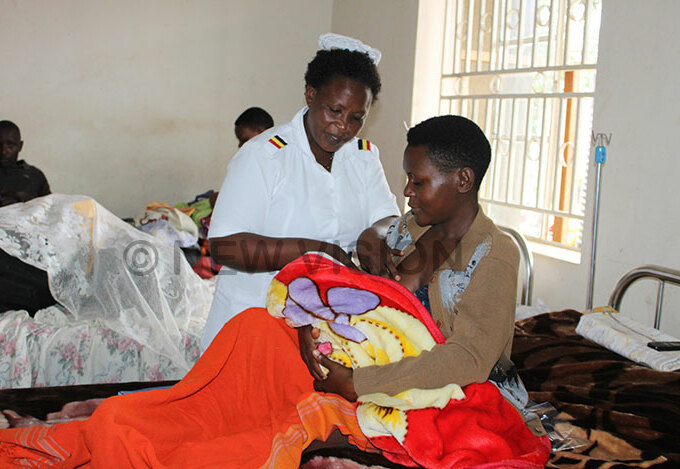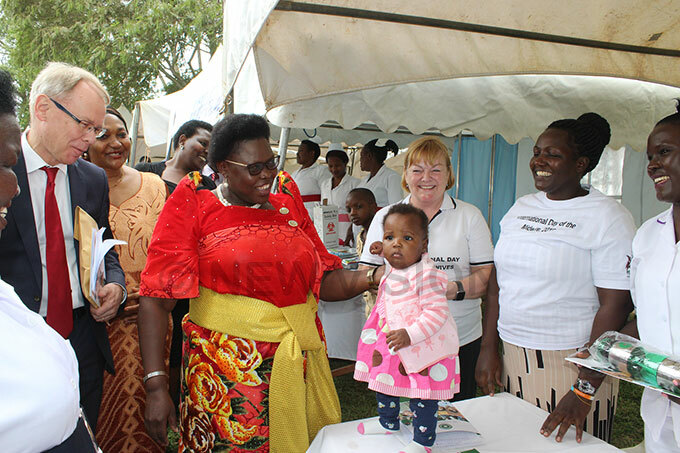Midwives demand for well-equipped facilities to aid their work
Evarista Tumushabe, a senior nursing officer and the deputy in charge Biwizibwera Health Center IV in Mbarara district reveals that sometimes they don’t get the requirements on time which affects service delivery.
HEALTH
MBARARA- Midwives in Uganda used the International Day of the Midwife celebration held in Mbarara district on Sunday to demand for well-equipped health facilities to aid them offer quality health care service.
Working in hard conditions, sometimes without supplies like gloves, mama kits, electricity and walking long distances, midwives find it hard to deliver services.
Evarista Tumushabe, a senior nursing officer and the deputy in charge Biwizibwera Health Center IV in Mbarara district reveals that sometimes they don't get the requirements on time which affects service delivery.
 Tumushabe attending to a mother at Bwizibwera Health Center IV in Mbarara district. (Photo by Geoffrey Mutegeki)
Tumushabe attending to a mother at Bwizibwera Health Center IV in Mbarara district. (Photo by Geoffrey Mutegeki)
"Sometimes we are forced to make mothers buy things like gloves, mama kits from other facilities because we don't have them in stock. The stock is always not enough," Tumushabe says.
Although in most cases midwives improvise or use their own money to help mothers, she revealed that the number of deliveries are overwhelming.
At Bwizibwera there are nine midwives who on average deliver 150 mothers every month.
"Even the money for fueling the ambulance is not enough, it is the mothers who fuel it in most cases when given referrals. But if government improves on these requirements we will deliver the best quality health services," Tumushabe says.
Trifornia Atukunda, a midwife at Bwizibwera Health Center IV says midwives always get into trouble of being branded corrupt because of such challenges.
"We need to be helped, I have worked for 15 years and what I have witnessed in health facilities is not good for us. They are always blaming midwives for charging money which in those cases it is unavoidable," Atukunda said.
Atukunda says on average she delivers at least five mothers every day but like most midwives, no one gets to recognise this work.
"There is a day when I delivered eight babies; it was at night and I was alone on duty. When I delivered the seventh I decided to call my colleague to come and help me, because the mother required referral," Atukunda says.
"Some mothers come to health facility on the day of delivery, they don't go for antenatal and some of them don't bring anything to receive the babies. We are the ones who even provide clothes to receive babies," she revealed.
Although World Health Organization (WHO) recommends that a midwife should deliver not more than 175 mothers a year, a midwife in Uganda delivers twice as much, according to United Nations Population Fund (UNFPA).
"With such figures midwives are overwhelmed and this affects the quality of care offered. Imagine a midwife delivering eight mothers in one night?. But what is more disheartening we rarely get appreciated," says Tumushabe,
Currently the national staffing gap for midwives stands at 36% where as in some areas like Bukedea, Karamoja it is between 50% and 60% according to statistics from UNFPA.
 Sweden AmbassadorPer Lindgärde and Minister Moriku. ( Photo by Geoffrey Mutegeki )
Sweden AmbassadorPer Lindgärde and Minister Moriku. ( Photo by Geoffrey Mutegeki )
At Bwizibwera Health Center IV there are nine midwives but the in charge says they should at least be 12 midwives to reduce on the work burden.
According to the Uganda Nurse and Midwives Council, there are 19,588 registered midwives in Uganda for a population of 40 million people.
The shortage of midwives is a countrywide challenge which the state Minister for Primary Health Care, Joyce Moriku Kaducu mentioned too on Sunday during celebrations to mark the International Day of the Midwife in Mbarara district.
"Government is aware of the shortage of midwives at local government facilities but we have started the restructuring exercise and recruitment where midwives will be absorbed," Moriku says.
She commended Midwives for dedicating their lives towards giving life despite the many challenges faced like lack of enough supplies of utilities and less appreciation.
The United Nations Population Fund (UNFPA) deputy representative Miranda Tabifor, revealed that midwives not only save lives but also empower women and couples to make informed, healthy choices.
"Midwives are public health heroes, ensuring that the woman can have a healthy pregnancy, safe childbirth and essential care for her newborn among the most basic human rights," Tabifor said.
She commended the midwives for contributing to the reduction of maternal mortality from 506 deaths per 100,000 live births in 2001 to 336 deaths in 2016.
On staffing, Tabifor revealed that since 2010, 590 midwives have benefited from the Midwifery Training Bursary and Bonding Programme that is supported by the Government of Sweden but only 306 have been deployed.
"Midwives trained under the scheme are yet to be absorbed. We recommend that government puts in place measures to improve the midwife -to-patient ratio and help reduce the burn out of already overburdened work force," Tabifor says.
Sweden Ambassador to Uganda Per Lindgärde revealed that midwives play a critical role of ensuring women rights are protected.
"It is because of your work that lives are welcomed in the world every day. We need to engage men before, during and after pregnancy to strengthen rights of women," Lingarde said.
The Acting Commissioner Health Services Nursing, Petua Kiboko Olobo says more midwives need to be recruited to fill the staffing gaps because the demand for their services is overwhelming.
"Many have studied but have not been employed. If we have more midwives it will greatly contribute to improvement of the quality of service offered by the midwives," Olobo says.
She challenged the ministry to work on gaps to do with utilities like mother kits, electricity, water, and gloves among others which are lacking in some health facilities.
"There is less they can do when they don't have the utilities," Olobo says.